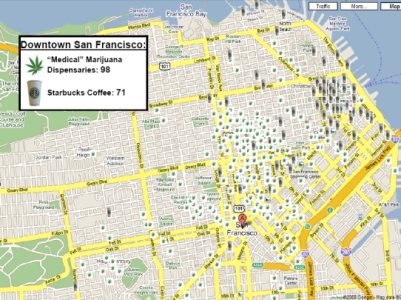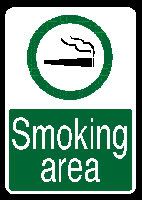Stopthedrugwar.org
Barack Obama wasn't the only big winner in Tuesday elections; marijuana polled just as well, if not better. A medical marijuana initiative in Michigan -- the first in the Midwest -- and a decriminalization initiative in Massachusetts both won by convincing margins, and scattered local initiatives on various aspects of marijuana policy reform all won, too.

Medicinal Marijuana plants growing under lights
In both the statewide initiatives, reform forces overcame organized opposition on their way to victory, mostly from the usual suspects in law enforcement and the political establishment. Michigan enjoyed the dubious distinction of a visit from John Walters, the drug czar himself, who popped in to rail against medical marijuana as "an abomination."
"We could be seeing a sea change in more ways than one in this election," said Bruce Mirken, communications director for the Marijuana Policy Project (MPP), which backed both state initiatives. "These are not just wins, but huge wins. In two very blue states, marijuana reform outpolled Barack Obama. At this point, we can look members of Congress in the eye and ask them why exactly they think marijuana reform is controversial."
The results are also an indicator of the decreasing influence of the drug czar's office, said Mirken. "A clear public mandate has emerged, and it's particularly noteworthy coming as it does after eight years of the most intense anti-marijuana campaign from the feds since the days of Reefer Madness," he said. "Despite all the press releases and press conferences, despite all the appearances and campaigning Walters has done to try to convince Americans that marijuana is some sort of scourge, the voters just said no."
In Michigan, the medical marijuana initiative organized by the local Michigan Coalition for Compassionate Care and backed in a big way by MPP won a resounding 63% of the vote. Michigan's new medical marijuana law will go into effect quickly -- ten days after the elections are certified, with the Department of Community Health having 120 additional days to come up with regulations for a registry.
The law will allow patients suffering from HIV/AIDS, cancer, glaucoma and other conditions to obtain a doctors' recommendation to cultivate, grow, and possess marijuana without fear of prosecution under state law. Registered patients may possess up to 2.5 ounces of usable marijuana and have up to 12 plants in a secure indoor facility, or they may designate a caregiver to grow it for them.
"Michigan voters have clearly signaled in no uncertain terms their support for a compassionate medical marijuana law," the committee said in a victory statement Tuesday night. "Our opposition threw the kitchen sink at us, hoping one of their false claims and outright lies would cost enough votes to tank this effort. But Michigan voters saw through the deception, and soon numerous seriously ill patients across the state will no longer need to live in fear for taking their doctor-recommended medicine."
Tuesday's win makes Michigan the 13th medical marijuana state, and, more importantly, the first one in the Midwest. The Michigan victory means planned or ongoing efforts in states like Wisconsin, Ohio, Minnesota, and Illinois just got a little easier.
In Massachusetts, Question 2, the marijuana decriminalization initiative, overcame the opposition of every district attorney in the state to win a resounding 65% of the vote. Now, instead of an arrest and possible six months in jail, people in the Bay State caught with less than an ounce of marijuana will face a simple $100 fine. Equally importantly, small-time possession offenders will not be saddled with a Criminal Record Information Report (CORI), a state arrest report that lingers long after the offense and can impede an offender's ability to obtain jobs, housing, and school loans.
Again backed by MPP, the Bay State's Committee for Sensible Marijuana Policy (CSMP) took the organizing lead in Massachusetts this year. Building on nearly a decade's worth of winning local questions on marijuana policy reform by groups like the Drug Policy Forum of Massachusetts and the state NORML affiliate, MassCann/NORML, the committee was able to go over the top statewide with decrim this year.
"It's great to see the people of Massachusetts were able to see what a sensible, modest proposal Question 2 is," said CSMP head Whitney Taylor. "It's going to end the creation of thousands of new people being involved in the criminal justice system each year and refocus law enforcement resources on violent crime."
While some prosecutors are already whining about having to implement the will of the voters, there appears little chance that legislators will attempt to step in and overturn the vote, as they could do under Massachusetts law. A spokesman for House Speaker Sal DiMasi told local WBZ-TV as much Wednesday afternoon.
"Question 2 now has the force of law and the Speaker sees no reason to consider a repeal or amendment at this time," said David Guarino, DiMasi's deputy chief of staff.
Statewide decrim wasn't the only marijuana-related issue on the ballot for some Massachusetts voters. Continuing the tradition of placing questions on representative district ballots, voters in four districts were asked: "Shall the state representative from this district be instructed to vote in favor of legislation that would allow seriously ill patients, with their doctor's written recommendation, to possess and grow small amounts of marijuana for their personal medical use?"
As with past medical marijuana questions, the question passed overwhelmingly in all four districts.
The question passed with 74% In the 1st Middlesex Representative District (R – Robert S. Hargraves), 71% in the 21st Middlesex Representative District (D – Charles A. Murphy), 73% in the 13th Norfolk Representative District (D – Lida E. Harkins), and 71% in the 6th Plymouth Representative District (R – Daniel K. Webster).
Meanwhile, in other local marijuana-related initiatives:
-
Berkeley, California's, Measure JJ, essentially a zoning initiative that would allow dispensaries operating in the city to expand into more non-residential districts, won with 62% of the vote. The campaign was organized by Citizens for Sensible Medical Cannabis Regulation. -
In Hawaii County, Hawaii (the Big Island), a lowest law enforcement priority initiative for adult marijuana possession won with 66% of the vote. The campaign organized by Project Peaceful Skies was an outgrowth of the movement to end intrusive marijuana eradication raids.
-
In Fayetteville, Arkansas, another lowest priority initiative passed. Some 62% of voters in the Northwest Arkansas college town agreed with Sensible Fayetteville and its director, Ryan Denham, that police had better things to do than bust pot smokers. Sensible Fayetteville itself is an umbrella organization including the Alliance for Drug Reform Policy in Arkansas, The Omni Center for Peace, Justice & Ecology, the Green Party of Washington County, University of Arkansas NORML and the Alliance for Reform of Drug Policy in Arkansas Inc.
"We think these election results send an extremely important message," Denham told the Northwest Arkansas Times Wednesday. "I'm not surprised since national statistics say that 70% of Americans feel that misdemeanor marijuana offenses should be a low priority. It clogs courts and jails and puts a burden on taxpayer resources."
Election day was a good day for marijuana reform. Let's hope that activists and politicians alike are now prepared to press for more in the near future.























